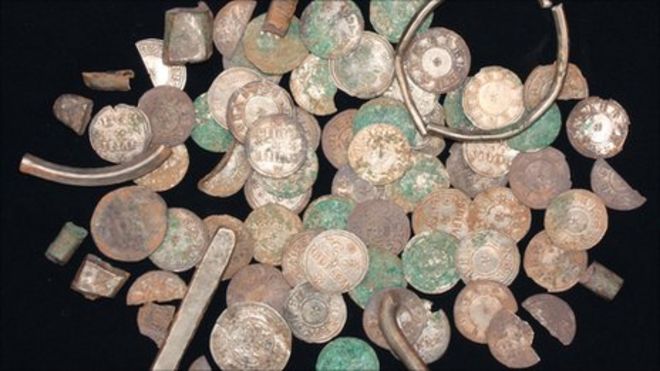Hoard of Viking coins worth at least £500,000 found during police raids
A hoard of Viking coins has been confiscated by police investigating an illegal trade in historic treasures that could rewrite British history.
The collection of coins and a silver ingot, dating back to King Alfred the Great’s reign of the 9th century, were retrieved at households in Durham County and Lancashire by police.
Believed to be worth at least £500,000, a leading expert has told the MailOnline they could ‘add significantly to our understanding of the political history of England in the AD 870s’ as they reveal a previously unknown alliance between King Alfred and his contemporary Ceolwulf II, King of Mercia.
Ceolwulf of Mercia was believed by historians to be simply a puppet of the Vikings – a minor nobleman rather than a proper King. But the recently discovered coins show the two rulers standing side by side, as allies suggesting a different story.
While Alfred became known as a national hero who defeated the Vikings, Ceolwulf was written off as insignificant and disappeared without a trace, with experts now suggesting the Mercia King was later ‘airbrushed out of history’ by Alfred. If confirmed, the discovery could reshape our view of how England was united and those who made it happen.
Police, who have now handed over the haul to the British Museum, have arrested a number of people on suspicion of dealing in culturally tainted objects and the complex police operation – codenamed Operation Fantail – is said by Durham Police to be in its early stages. They refused to give further detail on the arrests.

Shows King Alfred and Ceolwulf standing side-by-side, demonstrating their alliance .Believed to be worth at least £500,000, a leading expert has told the MailOnline they could ‘add significantly to our understanding of the political history of England in the AD 870s’ .
Detective Inspector Lee Gosling, Senior Investigating Officer for Operation Fantail at Durham Constabulary, said: ‘We believe the material recovered comes from a hoard of immense historical significance relating to the Vikings and we are delighted to have been able to hand it over to the British Museum.’
The British Museum believe the coins were in circulation at the time of King Alfred when he won a number of major battles in AD 878 that led to the defeat on the Vikings. Dr. Gareth Williams, the curator of Early Medieval Coins and Viking Collections at the British Museum, called the latest find ‘nationally important’.
He said: ‘This is the period in which Alfred the Great was fighting the Vikings, but which also led to the creation of a unified kingdom of England under Alfred and his successors. ‘The hoard contains coins both of Alfred and of his contemporary Ceolwulf II, King of Mercia.
‘The coins I have seen so far add significantly to our understanding of the political history of England in the AD 870s. Around the time the hoard was buried, probably in AD 879, Ceolwulf mysteriously disappeared, and Alfred then took over Ceolwulf’s kingdom as well as his own.’
Dr Williams added: ‘I think that the coins show that Ceolwulf II was in an alliance with Alfred of Wessex, and not a puppet of the Vikings as suggested in sources written at Alfred’s court a few years later, by which time Ceolwulf had disappeared without trace from history and Alfred had taken over his kingdom.
‘Sources from Alfred’s court, writing more than fifteen years later, describe as ‘a foolish king’s thegn’, who was only made king by the Vikings. ‘However, the coins show a working relationship with Alfred which the sources ‘forgot’ to mention, and his name suggests that he may well have been a legitimate descendant of earlier kings of Mercia.
‘Some of the coins show the name of Ceolwulf and the images on their back show two emperors standing side by side, and was almost certainly a deliberate choice to symbolize their alliance.’ This isn’t a completely new idea, but until recently coins of this period were too rare to prove the idea.
‘The discovery of this hoard strengthens the case that Ceolwulf and Alfred were allies and that Alfred’s spin-doctors later re-wrote history to suit the political situation of the time.’ The iconic figure of King Alfred is widely believed to be the man who saved England from the Vikings and is currently being portrayed by David Dawson in the BBC epic The Last Kingdom.
He spent several years fighting the Vikings, who were wreaking devastation in England, and won several decisive victories. Alfred ruled from 871 to 899 was instrumental in setting the foundations for England known nowadays without whom the English may have even spoken another language.
His defeat of the Vikings earned him the name Alfred the Great. But in recent years, his role has been called into question by a number of archaeological finds.
More than 200 pieces of Viking silver including coins, ingots, and jewellery were discovered buried in a field in Oxfordshire in 2015 which Shedd fresh light on King Alfred and the little-known ally, Ceolwulf II.
A spokesperson for Durham Police has said the investigation is ongoing and a number of people have been arrested on suspicion of dealing in ‘culturally tainted objects’.








